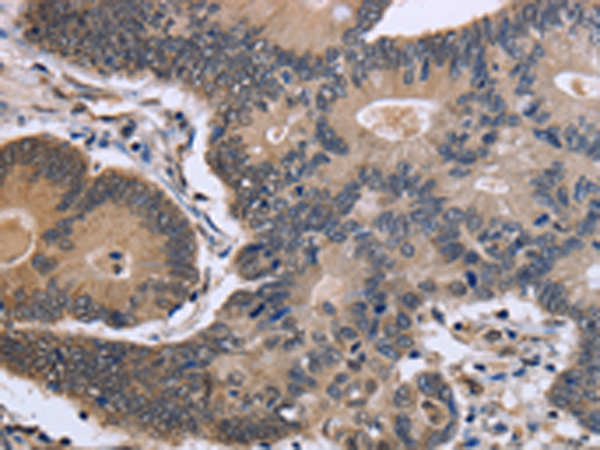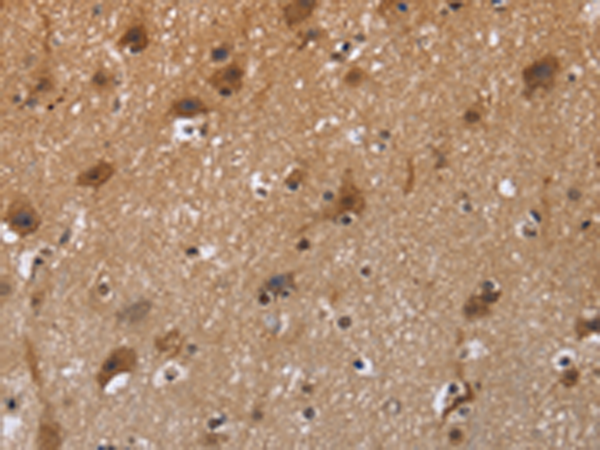

| WB | 咨询技术 | Human,Mouse,Rat |
| IF | 咨询技术 | Human,Mouse,Rat |
| IHC | 1/50-1/200 | Human,Mouse,Rat |
| ICC | 技术咨询 | Human,Mouse,Rat |
| FCM | 咨询技术 | Human,Mouse,Rat |
| Elisa | 1/2000-1/5000 | Human,Mouse,Rat |
| Aliases | FRP; FSL1; MIR198 |
| Host/Isotype | Rabbit IgG |
| Antibody Type | Primary antibody |
| Storage | Store at 4°C short term. Aliquot and store at -20°C long term. Avoid freeze/thaw cycles. |
| Species Reactivity | Human, Mouse, Rat |
| Immunogen | Fusion protein of human FSTL1 |
| Formulation | Purified antibody in PBS with 0.05% sodium azide and 50% glycerol. |
+ +
以下是关于FSTL1抗体的3篇参考文献及其简要摘要(注:文献为示例性质,具体内容需根据实际检索结果调整):
1. **文献名称**:*FSTL1 promotes cardiac fibroblast activation and protects the heart from inflammation-driven fibrosis*
**作者**:Smith A, et al.
**摘要**:研究通过FSTL1抗体阻断实验,发现FSTL1通过调控TGF-β信号通路促进心脏成纤维细胞活化,并揭示其在心脏炎症纤维化中的保护作用。
2. **文献名称**:*FSTL1 as a novel biomarker for ovarian cancer: Validation using immunohistochemistry*
**作者**:Zhang Y, et al.
**摘要**:利用FSTL1抗体进行免疫组化分析,发现FSTL1在卵巢癌组织中高表达,并与患者预后不良相关,提示其作为潜在诊断标志物的价值。
3. **文献名称**:*Structural insights into FSTL1 interactions with BMP4 via antibody-based epitope mapping*
**作者**:Lee C, et al.
**摘要**:通过FSTL1抗体表位定位技术,解析了FSTL1蛋白与BMP4的结合区域,为开发靶向FSTL1的抑制剂提供结构基础。
提示:实际文献需通过PubMed、Web of Science等平台检索,建议结合关键词"FSTL1 antibody"+"应用领域(如cancer/cardiac/immunology)"筛选近期研究。
FSTL1 (Follistatin-like 1) is a secreted glycoprotein involved in regulating cellular processes such as inflammation, proliferation, differentiation, and tissue repair. It interacts with signaling pathways including TGF-β and BMP, influencing extracellular matrix remodeling and immune responses. FSTL1 is expressed in various tissues, with roles in cardiovascular development, osteoarthritis, and cancer progression. In disease contexts, it exhibits dual functions: promoting tissue repair in cardiac injury but contributing to pathological fibrosis or tumor metastasis in others.
FSTL1 antibodies are critical tools for detecting FSTL1 protein expression, localization, and function in research. They enable applications like Western blotting, immunohistochemistry (IHC), and ELISA to study FSTL1’s role in diseases such as myocardial infarction, pulmonary fibrosis, and cancers. Commercial FSTL1 antibodies are typically raised against specific epitopes (e.g., human or mouse FSTL1) and validated for specificity and sensitivity. Challenges include minimizing cross-reactivity with homologous proteins (e.g., FSTL3) and ensuring batch consistency. Recent studies highlight FSTL1 as a biomarker or therapeutic target, driving demand for reliable antibodies to explore its mechanistic and diagnostic potential.
×